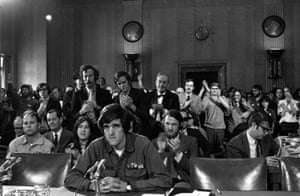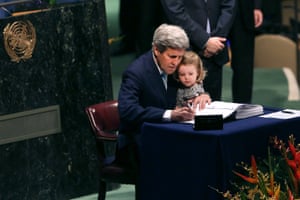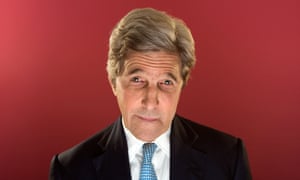The former US secretary of state has looked on as Donald Trump has
dismantled the Paris climate agreement. Now, 14 years after losing his
presidential bid, he is considering another
by Aida Edemariam
To look back at the moment John Kerry entered US public life, addressing the Senate foreign relations committee on 22 April 1971,
is to be struck by many things. There are the famous words, of course:
“How do you ask a man to be the last man to die in Vietnam? How do you
ask a man to be the last man to die for a mistake?” There is the shock
of dark, Beatles-inspired hair, the distinctly British-tinged accent.
Above all, there is the self-possession. Even though, as he describes it
in his new book, Every Day Is Extra,
he had not realised he would be the only witness until he had walked in
the door, breathless and young and late; even though he was describing a
situation about which he was deeply angry, he did not hurry his
delivery.
Perhaps – after the vivid pointlessness of months spent in
Vietnam, captaining vulnerable “swift boats” up muddy rivers; after
being shot at and experiencing the deaths of friends; after watching a
wounded Vietnamese soldier bleed to death in a US medical tent,
surrounded by well-meaning soldiers who could not give him the most
basic words of comfort in his own language, in his own country – the
committee held little fear. Perhaps it was his upbringing, as the son of
a state department lawyer and a mother whose extended family owned
estates in Brittany, France, and an island off Cape Cod in
Massachusetts; as a boy who attended elite boarding schools in
Switzerland and the US; as a young man who, while a competitive debater
and athlete at Yale, once went to visit a girlfriend (Jackie Kennedy’s
half-sister) and found himself sailing with JFK for an afternoon. Or
perhaps, as he puts it in his publisher’s offices in London, eyes
watchful, tired from jetlag and an appearance on BBC Radio 4’s Today
programme, it comes from “being a little kid on the train to Berlin,
travelling home alone from school”, a kid who by eighth grade had
attended seven schools. “It was just – survival. I am confident. I have a
confidence about things.”The accent is all American now, but the ease is still there, a kind of centred stillness that coexists with mercurial attention: one minute he is leaning back, genial, possibly bored; the next minute he is sitting forwards, engaged, answering questions with a thoughtfulness that, in this age of tweeted ignorance and bile, elicits pangs of regret for what used to be and still could be. He is far from immune to regrets himself and is upfront about what they are: voting for the second Iraq war, for one, and not going all-out to scotch what he argues was the first major irruption of fake news into presidential politics – the airing of ads, during his 2004 presidential campaign, that questioned his war record.

He is clearly still hurt – and furious at himself for not airing his own ads in response. They had been prepared: “We have records on film; [my swift boat crew are] all on film” – he leans forward, jabbing at the air with his index finger – “at LENGTH, telling the TRUTH.” He lost the race narrowly to George W Bush.
But no one seems to have managed it effectively so far – not the media and certainly not the Democrats – although Kerry disagrees on the latter point. “I think we just had an election which shows a lot is working. We just elected more members of Congress as Democrats than in any election since Watergate in 1974. Seven governors flipped from Republican to Democrat. Six legislatures flipped. We had huge additional turnout of young people – a 55% increase. One hundred and thirteen million Americans voted – we’ve never hit 100 before. So, it’s happening. That’s called accountability. And I think you keep organising and building the grassroots movement around the truth.”
Vietnam made Kerry an activist; it also made him a diplomat, a believer in talking, listening, doing whatever it takes to avoid war and to come to an agreement that might be constructive for the country. Kerry, who was elected to the US Senate in 1984 and served there for 28 years, talks fascinatingly and depressingly about how the institution changed in that time. When he arrived, “I had as many daughters as there were women in the US Senate” – two, from his first marriage, to Julia Thorne. The cigar- and alcohol-fuelled banter was locker-room salty, but there were characters such as Ted Kennedy, who provided wise advice. “Never explain,” for one thing – if you explain, you have already lost. (When he became secretary of state, Kerry was assiduous about collecting advice from previous incumbents. Condoleezza Rice told him to remember the big picture; Colin Powell implored him to sort out the ancient email system.)
"Do I think I’m capable of being president? Sure – I thought I was very capable and ready 14 years ago"
Kerry tries to guard against nostalgia, but he is horrified by the gradual erosion of respect and initiative in the Senate, the impossibility of contemplating bipartisan work, the loss of an upper chamber that was “more tolerant”. “There’s a lost sense of ‘senator’ – of the value of the Senate as a place of compromise. It’s a huge loss. The Senate was designed for moments like this. This is what the founding fathers wanted – to have six years in a term, so you’re not running to the passions of the House every two years. And there’s been such an orthodoxy that has set in.” Kerry cannot keep the disgust out of his voice: “I call them the orthodoxy police. Those are the people like [the Texas senator] Ted Cruz or [the former Louisiana senator] David Vitter, who would threaten their colleagues, in their own caucus, with the potential of a primary! ‘If you guys don’t go for this, well, we’re going to find someone to run against you because you know, it’s my way or the highway.’”
He also learned from the Senate the tactics that he would suggest to the new influx of Democrats – so many of them young, female and/or from ethnic minorities; an “incredible class”, in Kerry’s words – must be the way to fight Trump and all his doings: ignore the furores, the tweets and “legislate seriously. Be out there fighting for what the country needs, what the world needs,” to deal urgently with climate change, cyber threats, “the challenge of 2 billion young people between the ages of 15 and 24, 1.8 billion 15 or younger; 300 million of them won’t even go to school. Fifty-one per cent of the income of America going to 1% of Americans.”
The latter percentage, of course, includes Kerry and his second wife, Teresa Heinz. According to a 2015 New Yorker profile, between them they own at least six properties, including a 23-room mansion in Georgetown, Washington DC, and a 90-acre farm outside Pittburgh in Pennsylvania, as well as a 23-metre (76ft), $7m (£5.4m) sailboat called Isabel. “We’ve got to make America fair again. You gotta make things work for working folks so they can pay their bills and send their kids to school, reach the brass ring, retire in dignity, have healthcare – the priorities are pretty clear, in my judgment. We need infrastructure. Desperately. We need to start rebuilding America,” he says.
But who will lead them? Surely an obvious leader is what the Democratic party, going into the presidential election in 2020, needs desperately? “It’s part of the current cynicism,” says Kerry. “I think people want to know that they’re choosing someone with winability, with electability. [But] there is no clarity …” What does he think of Beto O’Rourke? The young former punk rocker did not win his Senate race against Cruz in Texas, but he came close. “I don’t … think so,” says Kerry. “But who knows. I mean, anyone can decide to run. He did energise people. He did a terrific job. But whether that translates into a presidential race – I don’t know.” (Kerry has his own history as a bassist, in a band called John Kerry and the Electras; the clips of his performance in the band, available on YouTube, are the only things he tells me to check out.)

The last quarter of Kerry’s book is taken up with a blow-by-blow account of the hard graft of being Barack Obama’s secretary of state – the hours and weeks of global meetings that eventually secured the Iran nuclear deal, that saw him take his two-year-old grandchild on stage to sign the Paris climate agreement, that crashed against the intractability of the Middle East conflict. Six months after Trump’s inauguration, the new president took the US out of the Paris agreement; this May, he pulled out of the Iran deal. How does it feel to watch things built with so much care being torn down?
‘There’s always hope’: John Kerry on Donald Trump, the US midterms and climate change – video
Surely he is angry, though? “You know what I’m angry about? People are going to die because of the decision Donald Trump made. My kids and my grandkids are going to face a difficult world because of what Donald Trump has done. But if you sound angry all the time, people aren’t going to listen to you.” Anger boiled over into a tweet last week, when he could not bear the farrago unfolding on Remembrance Day. “It was just a sad moment, for our country and for the presidency. The president of the United States did not go to an event because of rain, when those guys died in the rain, died in the snow, died in the gas, died in the mud, and not to honour them I thought was brutal.”
How does he think the US is seen now, two years after he left office? His voice drops low. “I think America right now is a big question mark for a lot of people. And I regret that; I hate that. As somebody who worked so hard to have America be a leader, a principled participant in global affairs, a grownup, and see us now – our credibility, people actually laughing and hating at the same time – that’s a real problem. I want to see it change and I’m going to work very hard to make it change, one way or the other.”
Every Day Is Extra by John Kerry is published by Simon & Schuster UK. To order a copy for £22 (RRP £25), go to guardianbookshop.com or call 0330 333 6846. Free UK P&P over £15, online orders only. Phone orders minimum P&P of £1.99.

No comments:
Post a Comment